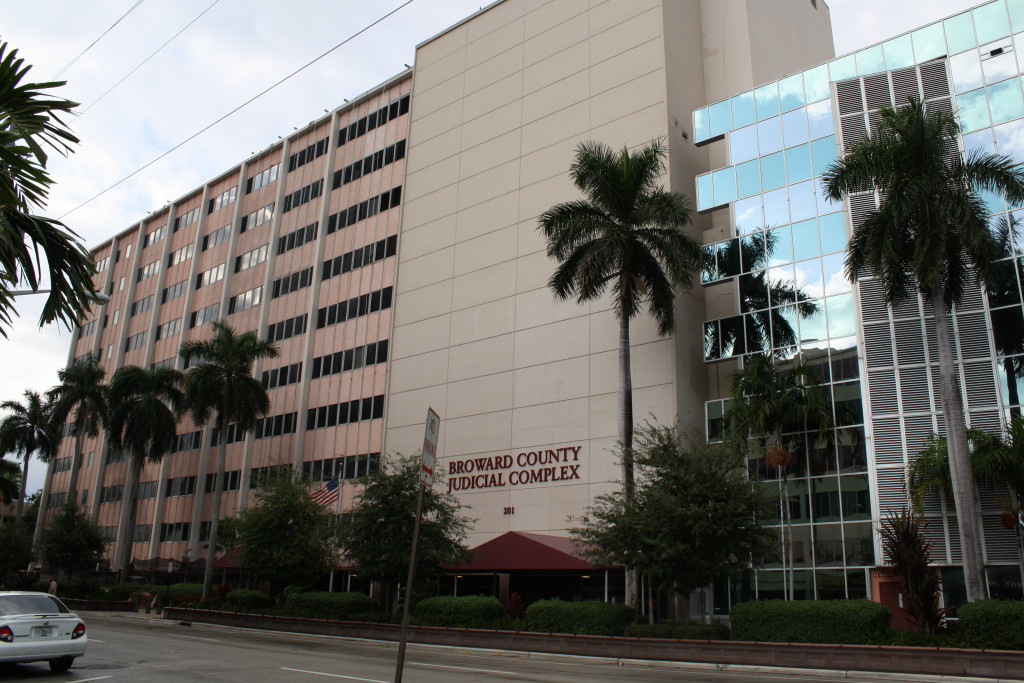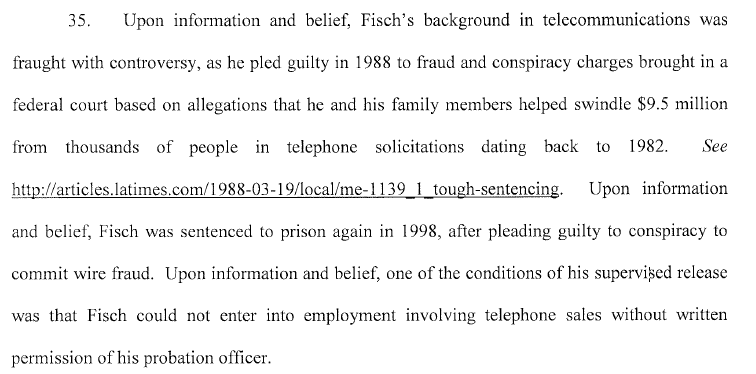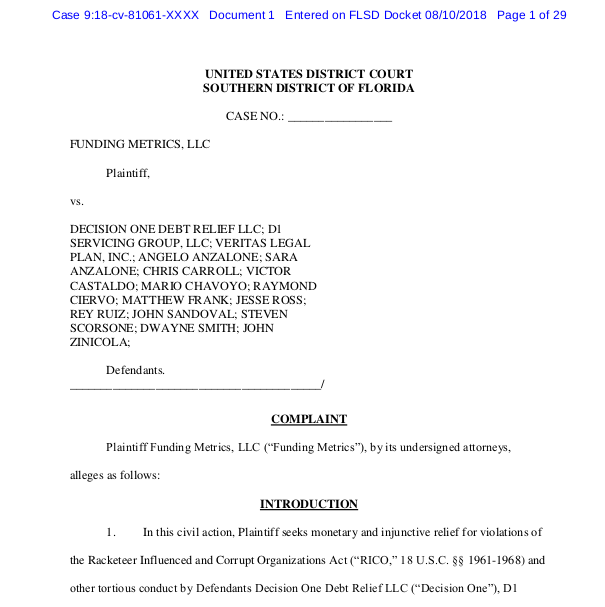debt settlement
Law Firm Sued Over “Debt Relief” Practices
July 9, 2024Another alleged “debt relief” law firm is under fire by a small business lender. This time the lender is National Funding and their latest lawsuit names not only a borrower that breached a loan agreement as a defendant but also a New York based law firm named J.S. Fritzon Law Firm, P.C.
According to the Complaint filed in San Diego County of California’s Superior Court, after the defendant law firm identifies National Funding’s customers, they contact them, offer to provide debt relief services, and attempt to persuade them to breach their obligations.
“As part of this effort, Non-Borrower Defendants routinely make misleading representations to National Funding’s customers, including by promising to save them money by settling their obligations to National Funding for a discounted amount when Non-Borrower Defendants have no legitimate basis for making such a promise and no reasonable expectation of being able to fulfill such a promise,” it says.
Among the causes of action against that defendant in particular are Intentional Interference with Contractual Relations, Unfair Competition, Conducting Business as a Prorater Without a License, Unauthorized Practice of Law, and Violation of Uniform Voidable Transfer Act.
The case number is 37-2024-00021246-CU-BC-CTL.
An MCA Debt Settlement Owner Arrested by FBI
May 8, 2024 One of the alleged masterminds behind MCA Cure LLC, LDMS Group, LLC, and Evergreen Settlement Group LLC, was arrested by the FBI six weeks ago after inducing merchants to divert payments away from their MCA providers and then failing to negotiate with the funders.
One of the alleged masterminds behind MCA Cure LLC, LDMS Group, LLC, and Evergreen Settlement Group LLC, was arrested by the FBI six weeks ago after inducing merchants to divert payments away from their MCA providers and then failing to negotiate with the funders.
The accused is Mark Csantaveri, who is named along with two unnamed co-conspirators from New Jersey. Both co-conspirator names were made easily discoverable by details disclosed by the FBI however. The debt settlement websites made claims that they had a “proven proprietary debt restructuring system” that could lower their payments by 80%. As part of the enrollment process, merchants were directed to send funds to an escrow account, for which the co-conspirators would then transfer to their own personal accounts.
According to the complaint, they would then claim to be negotiating with the funders and give updates about waiting to hear from attorneys and settlements. The charges are for Wire Fraud, Conspiracy to Commit Wire Fraud, and Money Laundering.
Csantaveri was immediately remanded to jail, was represented by a public defender and was only recently released on a $200,000 unsecured bond.
“Csantaveri and his conspirators misappropriated the victims’ money for their personal use, including over $1 million in gambling expenses,” the DOJ said. “Csantaveri’s scheme ultimately defrauded more than 50 victims of more than $3.4 million dollars.”
Conspiracy to commit wire fraud is punishable by a maximum of 20 years in prison and a fine of $250,000 or twice the gross gain or loss involved in the offense, whichever is greatest.
“MCA Debt Settlement” Company Sued
May 7, 2024A firm that offers to “restructure corporate debt primarily MCA or Merchant Cash Advance debt” was sued last month by a small business owner for fraudulent inducement, consumer fraud, unjust enrichment, breach of fiduciary duties, and for a declaratory judgment. Corporate defendants include MCA Resolve LLC and Coastal Debt Resolve (ABSM LLC) in addition to several individuals.
The alleged scheme, as laid out by plaintiff, asks business owners to pay huge fees to the debt settlement firm all while being forced to default on their business financing agreements on the hope that they might eventually get a proposal to settle for far less than the amount agreed. In this case, plaintiff explained that the result was that they actually ended up owing more because of how much defendants were charging. The case was filed in the Superior Court of Arizona and can be viewed here.
Notably, MCA Resolve LLC is currently being sued by two unrelated MCA funding companies in the New York Supreme Court.
Got an Offer to Settle Your Debts? Be Careful!
May 25, 2023 “Imagine a small business owner who is getting calls and demand letters and lawsuits from their creditors,” said Steven Zakharyayev, Managing Attorney at Law Offices of Steven Zakharyayev, PLLC, “then this debt relief company comes along and claims they can help. Desperation makes them an easy target.”
“Imagine a small business owner who is getting calls and demand letters and lawsuits from their creditors,” said Steven Zakharyayev, Managing Attorney at Law Offices of Steven Zakharyayev, PLLC, “then this debt relief company comes along and claims they can help. Desperation makes them an easy target.”
Unlawful debt settlement schemes can take many forms but a common one is a third party enticing a merchant into believing that they can resolve their debts at a discounted price when there is no basis for that to be true.
“[The scammers’] marketing preys on small business owners who may be in tough financial situations with ‘pie in the sky’ promises,” Zakharyayev said.
Common red flags indicating a potential fraudulent marketing pitch include requests for upfront payments, down payments, or monthly installments. Third party assistance in and of itself is not necessarily unlawful but the debtors should conduct thorough due diligence on any proposal they receive.
“Consumers can look up the debt negotiation companies and find out if they are legit and how they work by looking up reviews and searching up the company,” said Manny Yosipov, CEO at Advanced Recovery Group.
Debtors should also take care to understand whom it is they are even speaking with. Sometimes the identity of the person calling to address a debt is not clear. Is it a creditor? A collections firm acting on behalf of a creditor? Or a third party with no relationship to the creditor at all? This can become all the more confusing when more than one communcations channel is being used.
“The amended FDCPA allows debt collectors to use newer technologies, such as email and text messages, to communicate with consumers regarding their debts, subject to certain limitations, which protect consumers against harassment or abuse,” said Yosipov.
Meanwhile, Zakharyayev emphasizes the importance of creditors informing clients about the types of communications they might receive from third-party scammers and the unrealistic promises these scammers may make to settle their debt. Merchants should be aware that debt settlement companies often charge significant fees to settle debts that merchants could likely handle themselves.
“Businesses and their customers are usually better off in the long run if they communicate and are transparent with their financial records,” said Zakharyayev. “Once the debt settlement companies get involved, the situation gets more complicated and ironically less likely to settle.”
War on Debt Settlement Continues: 16 Defendants Sued in RICO Case
September 6, 2018
Fourteen individuals and two companies (including Decision One Debt Relief) were sued by Funding Metrics in Federal court last month for allegedly “conducting a nationwide illegal debt restructuring scheme through numerous acts of mail and wire fraud.”
The suit, which stems from the defendants’ interference with Funding Metrics’ merchant cash advance customers, makes six claims, among them financial damages resulting from state and federal crimes. Per the complaint:
“Defendant Decision One (along with its affiliate/alter ego D1 Servicing) fraudulently presents itself as being able to renegotiate and restructure merchant agreements with Plaintiff and other funding companies. It has established a deceptive business practice of making misleading and often outright false representations to merchants under contract with Plaintiff promising that, with its help, these merchants will save money on those contracts by defaulting on them. Decision One tells merchants that they can safely stop paying cash advance funding companies like Plaintiff; that it will go to work for them promptly; that it can reduce their debt by 60-80% or more; and that they will be provided with a Veritas insurance plan to cover legal expenses arising from their defaults, once cash advance companies exercise their rights under agreements with their merchants, as they inevitably will. Based on these misrepresentations, the merchants default on their contracts with their funders – that is, at Decision One’s direction, they stop paying their funders and instead pay Decision One – although Decision One does not even expect to achieve results for the merchants. The result is a fraud on the merchants and tortious interference with the contracts Plaintiff have with them.”
The suit is just the latest bomb dropped on the exploding debt settlement industry. deBanked began covering the controversy surrounding debt settlement in late 2016 after the owner and employees of an upstate New York debt settlement company were arrested for charging merchants to restructure their merchant cash advances and then not actually performing any services. The owner, Sergiy Bezrukov, was charged with money laundering, bank fraud, mail fraud, wire fraud and conspiracy to defraud. Bezrukov has been locked away in jail for almost two years awaiting trial. He is facing a maximum of 30 years. Two of his employees pled guilty, Vanessa Cardona to bank fraud and Dustin Walker to conspiracy to commit bank fraud.
Since then, nearly a dozen major lawsuits have been filed by merchant cash advance companies against other debt settlement companies that are alleged to be carrying out similar schemes. One of those sued companies, NJ-based Corporate Bailout LLC, was featured on the cover of the New York Post last summer for being “the craziest office in America.” Corporate Bailout was sued by both Yellowstone Capital and Everest Business Funding which later resulted in a very public settlement agreement that forced Corporate Bailout to fork over $500,000 to the two MCA companies.
Decision One Debt Relief, sued now by Funding Metrics, was also originally a co-defendant alongside MCA Helpline in a lawsuit filed by Everest Business Funding earlier this year. In February, after determining the two were not related, Everest dropped the claims against Decision One only. The suit against MCA Helpline is still pending.
Around that same time, a representative for Decision One revealed to deBanked that the company was on track to be doing more than $100 million a year in business.
Bezrukov, by contrast, who currently resides in a Niagara County New York jail, is accused of having only obtained $1.2 million throughout his entire debt settlement venture’s existence. Although Decision One is not being charged criminally, the private civil suit alleges damages caused by a violation of criminal statutes including RICO.
The Funding Metrics suit against Decision One was filed in the Southern District of Florida under ID# 9:18-cv-81061.
Settling Up: Debt Settlement Companies Paid Yellowstone Capital and Everest Business Funding a Half Million Dollars to End Lawsuit
June 12, 2018 A group of debt settlement companies and ISOs have entered into a settlement they’re unlikely to forget. A lawsuit that accused Corporate Bailout, Protection Legal Group, Mark Mancino, Michael Hamill and others of tortious interference with merchant cash advance contracts has led to a settlement in which the defendants agreed to pay Yellowstone Capital and Everest Business Funding $500,000. They also agreed not to offer any services to Yellowstone or Everest merchants in the future, deBanked has learned.
A group of debt settlement companies and ISOs have entered into a settlement they’re unlikely to forget. A lawsuit that accused Corporate Bailout, Protection Legal Group, Mark Mancino, Michael Hamill and others of tortious interference with merchant cash advance contracts has led to a settlement in which the defendants agreed to pay Yellowstone Capital and Everest Business Funding $500,000. They also agreed not to offer any services to Yellowstone or Everest merchants in the future, deBanked has learned.
The original complaint alleged that ISOs had partnered with companies that purport to offer debt relief services to merchants with MCAs. In practice, the complaint said, debt relief was a code word for deceiving merchants to breach their existing agreements so that they could pay fees instead to the debt relief companies.
When asked to comment, Yellowstone Capital CEO Isaac Stern said that there were companies that offer this kind of service the right way but that was not the case here. “The way they’re going about it is really wrong,” he said.
Of note is that the bound parties were not just debt settlement companies but also ISOs and a law firm (Mark D. Guidubaldi & Associates, LLC dba Protection Legal Group).
Additional companies not named in the original complaint but nonetheless bound to the settlement are Mainstream Marketing Group and Corporate Client Services LLC. Websites for both companies say that they offer small business debt relief services.
Coast to Coast Funding LLC, who the defendants represented they had no control of, did not participate in the deal.
The settled matter is not the first of its kind. Everest and Yellowstone have been hammering debt settlement companies with lawsuits this year, according to court records examined by deBanked. In January, Everest sued MCA Helpline and Todd Fisch for tortious interference, and just last month Yellowstone filed a Petition to recover funds that were allegedly fraudulently transferred by Settle My Cash Advance.
In the latter case with Settle My Cash Advance, the defendants are alleged to have actively coached a merchant to hide his money in new bank accounts and hide the paper trail rather than pay the money owed to Yellowstone.
Speaking about no case in particular, Stern said “Imagine getting a commission on a deal [where you help a small business get funding] and then sending it to a debt settlement company. If there are ISOs that are doing that, we’re going to come after you hard.”
Sneaky Debt Settlement Company Temporarily Restrained by Judge
May 20, 2018 A debt settlement company has sunk to new lows, according to a petition filed by Yellowstone Capital in Nassau County. Defendants SMCA, Inc. DBA Settle My Cash Advance, Thassos.com Corp DBA Thassos.com, and George Alexander, have been accused of fraudulently transferring funds owed to Yellowstone Capital to themselves while trying to mask the evidence in the process.
A debt settlement company has sunk to new lows, according to a petition filed by Yellowstone Capital in Nassau County. Defendants SMCA, Inc. DBA Settle My Cash Advance, Thassos.com Corp DBA Thassos.com, and George Alexander, have been accused of fraudulently transferring funds owed to Yellowstone Capital to themselves while trying to mask the evidence in the process.
Unlike other purported debt settlement schemes, the Settle My Cash Advance defendants are alleged to have first actively coached a merchant to hide his money in new bank accounts rather than pay his judgment. This, according to emails attached as exhibits, included instructions by the defendants on how to cover up the paper trail so that the money could not be traced. Once this was successfully carried out, the defendants then absconded with the merchant’s money, leaving him broke and the judgment still unpaid.
According to the merchant’s sworn affidavit, Settle My Cash Advance lured him into believing that they not only had a relationship with Yellowstone but that they would also reduce the judgment entered against his business by 25% – 70%.
“SMCA (Settle My Cash Advance) told me to transfer all funds, as my business and I earned them, to SMCA to hold them for us so that Yellowstone could not collect on its judgment,” the merchant wrote. “The deal that SMCA represented to me was that SMCA would take the funds, hold them in trust, and use them to settle our obligations with Yellowstone for a small contingency fee.”
What happened instead is that the defendants ran off with the money held in trust and did nothing to help with Yellowstone, the documents say.
Presented with the facts laid out before it, the Court ordered that the funds held by Settle My Cash Advance be restrained pending a May 30th hearing.
MCA Helpline, A Debt Settlement Company, is Sued For Tortious Interference
January 25, 2018
Debt settlement is under fire again. This time it’s a trio of defendants, namely MCA Helpline, LLC, Decision One Debt Relief, LLC and Todd Fisch individually, according to a complaint filed by plaintiff Everest Business Funding on Wednesday in Broward County, Florida.
Everest is seeking damages for Defendants’ tortious interference with at least a dozen of its merchant contracts.
“Defendants have engaged and continue to engage in the business practice of making misleading representations to Everest’s customers; namely, promising to save the merchants money on their existing contracts with Everest when they have no intention or ability to uphold such a promise,” the complaint states. “In so doing, Defendants tortiously interfere with Everest’s merchant agreements by inducing the merchants to breach their contractual obligations to Everest in favor of entering a new payment relationship with the debt relief company.”
Fisch is alleged to be the mastermind behind both MCA Helpline and Decision One Debt Relief.

Complicit ISOs were also put on notice. “To the extent any specific ISOs or their affiliates who have ISO Agreements with Everest have leaked information about Everest’s merchants to Defendants, or to any other third party, such conduct constitutes both a breach of the ISO Agreement and tortious interference with Everest’s merchant contracts,” it reads. “Through the course of discovery in this lawsuit, Everest plans to add as additional Defendants, as yet unidentified ISOs, which have been working with Defendants to target Everest’s merchant accounts in violation of their contractual agreements.”
Everest has been vigorously pursuing debt settlement companies. In September, they, along with Yellowstone Capital, filed a lawsuit against eight defendants (later amended to include 1 more) in New York.
Another lawsuit examining similar issues was also filed last year in New York. In Pearl Gamma Funding and Pearl Beta Funding v Creditors Relief, Pearl tacked on a defamation claim in addition to tortious interference. That case is still pending.






























